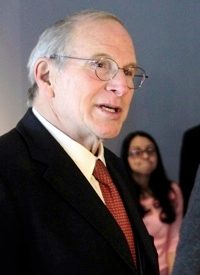
More than 650 people showed up at the State House in Concord Thursday for a public hearing on bills to repeal New Hampshire’s same-sex marriage law, passed in 2009. The vast majority was opposed to repeal, according to the New Hampshire Union Leader, and even supporters of the legislation were in favor of putting off consideration until next year so that lawmakers can focus this year on the state’s fiscal and economic problems.
“House Republican leadership made clear their main priority is to restore fiscal responsibility to New Hampshire by balancing the budget, creating a business-friendly environment, job creation and tax relief,” said Rep David Bates, a Windham Republican and primary sponsor of a bill to repeal the two-year old law that defines marriage as a union between any two persons. Another bill that was heard Thursday would define marriage as a union between one man and one woman. A third would establish domestic union as a civil contract.
“House leadership made it clear that next year this legislation will be a priority,” Bates said. But both repeal advocates and defenders of the same-sex marriage laws were determined to be heard on the issue, with one side arguing that the current law is an assault on the traditional, family-based concept of marriage, while the other argued that repeal would amount to state discrimination against those wishing to marry others of the same gender.
“These bills you are hearing today would sanction inequality and discrimination. Is that what you want?” asked former state Sen. Harold Janeway, a Democrat from Webster. Pastor Garret Lear of the Well of Living Water Christian Fellowship and Ministries in Wakefield argued for repeal, saying that for the state to sanction same-sex marriage “you have to change the Scriptures, you have to change a lot of things that are fundamental to this country.” State Sen. Fenton Groen, Republican of Rochester, added a public health concern to the moral issues, arguing that in neighboring Massachusetts, where same-sex marriage has been in effect since in 2004, the state “has encouraged children to practice a lifestyle — legitimized it in marriage — that will significantly increase the risk of sexually transmitted disease.”
Rev. Frank Irvine, a retired pastor of the United Church of Christ in Concord, said he conducted civil ceremonies for two same-sex couples. He dismissed the argument that legal sanction of such unions undermines traditional marriage. “I’ve been married over 50 years there is no way anything about the gay marriage law can be a threat to me and my marriage,” he said.
“Recognizing marriage as the legal union between one man and one woman” is one of the principles spelled out in the 2010-2011 New Hampshire Republican Party Platform. But after the GOP won back control of both houses from the Democrats in last year’s elections, party leaders decided to focus on trying to come up with a balanced budget in the face of projections of a $600 to $800 million deficit in the next biennium under current tax and spending levels. A Democratic-controlled legislature passed the state’s Equal Access to Marriage Act in 2009 after Iowa’s Supreme Court and Maine’s legislature and governor established same-sex marriage in those states. New Hampshire is one of five states nationally and one of four of the six New England states that currently have same-sex marriage laws. Rhode Island has never had such a law and Maine repealed its new marriage law by referendum within six months of its passage. In 31 states where the public has voted on the issue, same-sex marriage has been rejected all 31 times.
New Hampshire has no provision for adopting a law by referendum, except for a constitutional amendment, which requires a two-thirds approval by each house of the Legislature, confirmed by two-thirds of those voting in a general election. While the current Republican-dominated Legislature could pass a repeal of the 2009 law either this year or next, it would likely be vetoed by Democratic Gov. John Lynch, who signed the act two years ago.
But while the proposed legislation might not be acted upon this year or even enacted in 2012, it is clear the issue will not go away any time soon.
“We’ll be back here every year if we have to be as long as marriage quality is an issue,” promised former state Rep. Ed Butler, a Democrat from Hart’s Location.
Photo: Resident Lew Feldstein speaks against a bill to repeal New Hampshire’s Gay Marriage law at anews conference, Feb. 16, 2011 in Concord, N.H.



